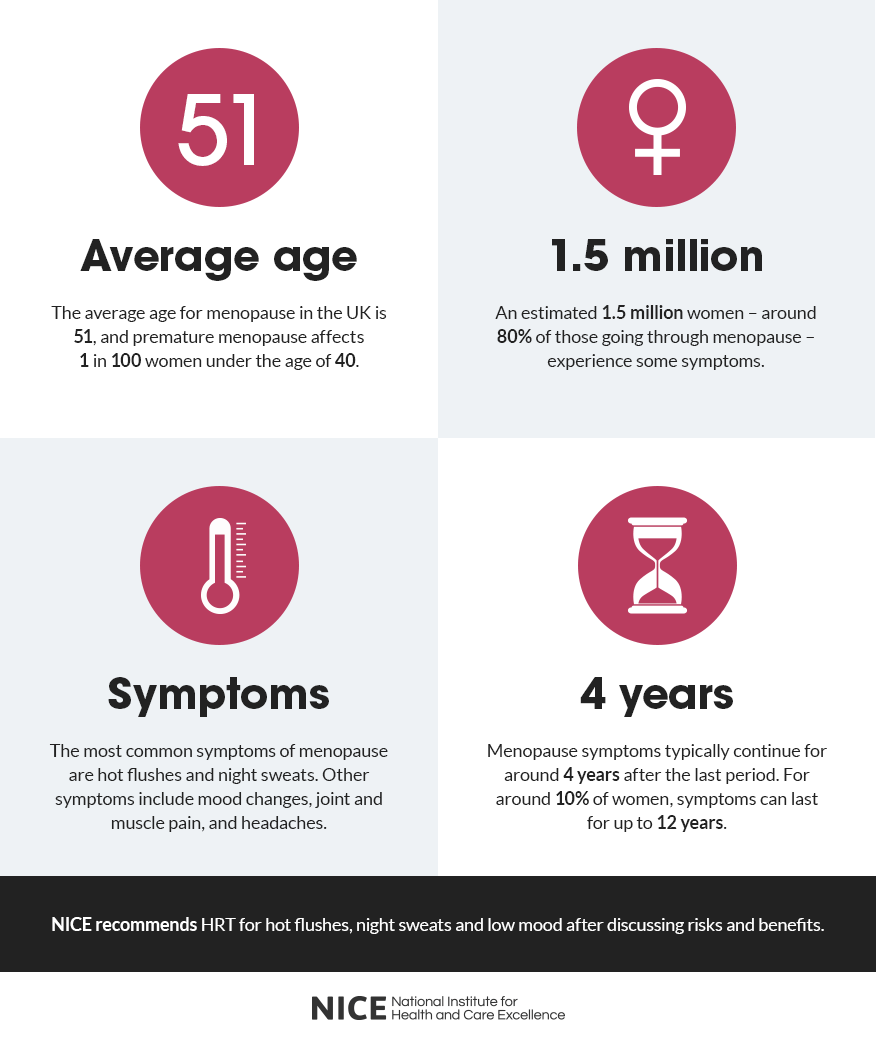Women with symptoms of menopause should not suffer in silence
12 Nov 2015 03:28 PM
Women whose lives are being affected by the symptoms menopause should not feel they have to suffer in silence, says NICE.

In its first guideline on menopause, NICE recommends that help and information is available for women with menopause and that a range of treatment options such as HRT can help.
Menopause is a gradual process that occurs on average for women in the UK at 51. An estimated 1.5 million women – around 80% of those going through menopause – experience common symptoms such as hot flushes and night sweats. Other symptoms include mood changes, joint and muscle pain and headaches.
Together these symptoms can severely affect a woman’s life. Yet the effects of menopause are often not fully understood. As a result, women do not always get the help they need from their GP, nurse, practice or hospital specialist to manage their symptoms effectively.
NICE aims to address this by providing recommendations on the support, information and treatments available for menopausal symptoms. The guideline covers diagnosis, the drug and non-drug treatments that can help with symptoms, and offers clarity on the risks and benefits of HRT.
Providing information and advice
The guidance is underpinned by recommendations that call for women to have the right to be involved in discussions and make informed decisions about their care.
It recommends that healthcare professionals should give information to menopausal women and their family members or carers. This should include:
- an explanation of the stages of menopause
- common symptoms
- lifestyle changes that can help their general health and wellbeing
- benefits of and risks of treatment for menopausal symptoms
- the long- term health implications of menopause
Healthcare professionals should also explain discuss the range of symptoms associated with menopause, and offer information about the types of treatment available.

HRT among several effective treatment options for menopause
Hormone replacement therapy (HRT) is a treatment option for menopausal symptoms, yet over the last decade confusion over its safety has led to a decline in its use and variation in practice.
The guideline says HRT is effective for treating several menopausal symptoms. It recommends offering HRT for hot flushes and night sweats after discussing the risks and benefits.
HRT should be considered to alleviate low mood that arises as a result of menopause. Cognitive behavioural therapy should also be considered for this purpose.
A number of tables are included in the guideline to explain the risks of using HRT. Healthcare professionals can use these to explain and confirm that HRT does not increase cardiovascular disease when started in women aged under 60 years, and that it does not affect the risk of dying from cardiovascular disease.
The guideline says HRT is not associated with an increased risk of developing type 2 diabetes. Furthermore, oestrogen-only HRT has little or no increase in the risk of breast cancer. HRT with oestrogen and progestogen can be associated with an increase in the risk of breast cancer but any increase risk reduces after stopping HRT.
Other treatment options NICE recommends include offering vaginal oestrogen to women with urogenital atrophy. Moisturisers and lubricants can also be used alone or in addition to vaginal oestrogen for vaginal dryness.
Read the recommendations
New guidelines are a “gold standard” for managing menopause
Dr Imogen Shaw, a GP with special interest in gynaecology and member of the NICE guideline development group, said: “Women should not feel they have to suffer in silence when menopause is affecting their daily lives at work and at home.
“The effects of menopause are often misunderstood and underestimated – it can impact on health significantly in both the long term and short term. Menopause can cause unbearable hot flushes and night sweats.
“I really hope these guidelines will stimulate interest from women in exploring how they can best manage their menopausal years.”
Christine Carson, Programme Director at the NICE Centre for Clinical Practice, said: “Women don’t always get the help they need from their GP, practice nurse or hospital specialist to manage their symptoms but this guideline recommends effective treatments which can help.
“The message to women is clear – talk about the menopause with your clinician if you need advice on your symptoms - it’s very important to discuss the options to find what might help you.”
Professor Mary Ann Lumsden, chair of NICE guideline development group and honorary consultant gynaecologist at Glasgow Royal Infirmary, added: “The guideline covers the treatment of symptoms and also looks again at the place of HRT in treating menopausal women.
“It emphasises that, for most women, HRT is a very effective treatment for several menopausal symptoms, for example hot flushing and also reduces the risk of osteoporotic fracture.
“Every woman who is worried about the effects that menopause is having on her life must be given the chance to find if there’s an option that works for her.”